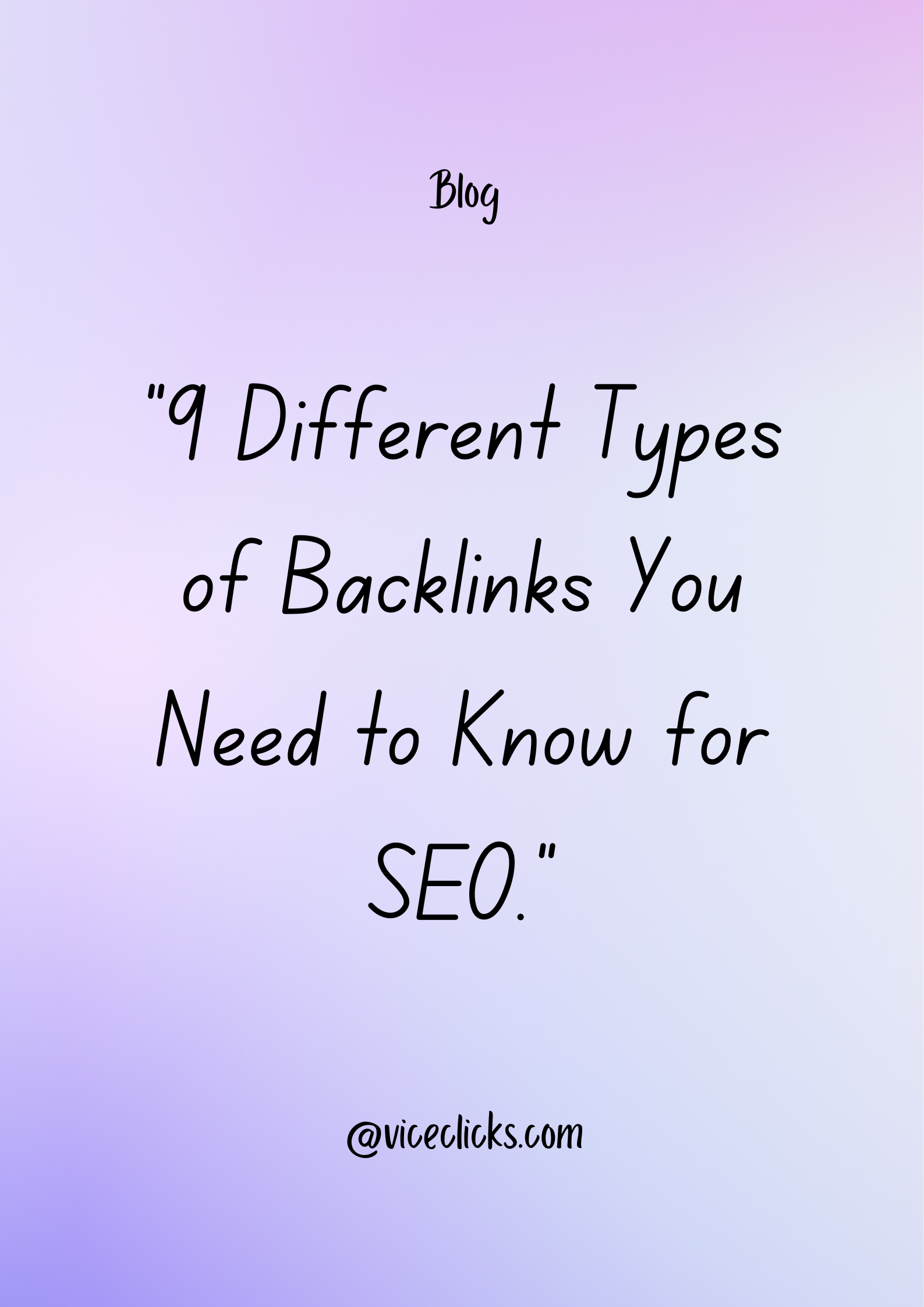9 Different Types of Backlinks You Need to Know fo …

Backlinks are the most frequently used terms in search engine optimization (SEO). Establishing backlinks with renowned and authoritative websites plays an important part in Google’s algorithm. They can be the decisive factor in whether a website rises or falls in Google’s search results.
Backlinks are sometimes referred to as inbound links, incoming links, or one-way links. These links are clickable and allow you to jump from one website to another’s page. Google and other search engines think backlinks heavily influence the quality and quantity of your website. The pages with backlinks are more likely to get good organic search engine rankings as they are packed with more information that provides their web pages and websites with good traffic.
Backlinks are considered votes for your website compared to other websites. If there are many votes, it is telling search engines that this content is worth reading, credible, and useful. As a result, the more votes you have, the higher your site will rank in Google, Bing, Yahoo, and other search engines. Introducing backlinks in a search engine’s algorithm is an old concept. The original Google algorithm called the PageRank was founded using backlinks. However, Google made several changes in its algorithm later. Backlinks still flourish to continue to be a key ranking factor. Backlinks are still considered one of Google’s three most necessary search engine ranking factors, along with ‘content’ and ‘rankbrain’.
Backlinks are not all created equal. Quality backlinks are administered to put a higher rank in the SERPs. A single top-quality backlink can outperform 100 low-quality backlinks. As it turns out, the same characteristics are exhibited by high-quality backlinks.
9 Different Types of Backlinks
Here are the different types of backlinks that can be considered and make your link-building plans for acquiring top-notch links that will benefit your SEO.
1. Editorial Backlinks
Editorial descriptions containing a link to your site and embedded inside relevant, high-quality material are the perfect backlink.
As a general rule, editorial backlinks are formed when your content (like an article or infographic) is mentioned as the source of certain information, a business representative is quoted, or when your site is featured in a link roundup on a certain topic.
To acquire editorial backlinks, generate evergreen content that establishes your position as a thought leader, establishing your site and brand as a go-to destination for interviews and industry expertise. Create easy to share and captivating content that has the potential to go viral.
Utilize SEO tools capable of identifying hot keywords and subjects that rivals have mastered but your site has yet to tackle.
2. Backlinks From Guest Blogging
When sending guest articles to established websites, attaching an editorial hyperlink to your site is often viable. Guest blogging outreach should be a big part of almost any SEO plan. You should try to find high-quality sites for these opportunities.
3. Backlinks in Business Profiles
When you set up digital profiles for your business on business listing websites, social networks, industry directories, and review sites, you almost always have the option to link to your website (or a few). Search engines see these entries as proof that a site has been around for a long time.
4. Backlinks from Webinars
Webinars provide useful information for sites to link to. Websites often put webinars on their pages to link to your company and mention what your company does. You can gain these backlinks by using strategies similar to those used for blog promotion. Your webinar can be a resource for the websites you’re focusing on for guest blogging.
5. Free-Tool Backlinks
Giving up a great tool for free is another effective way to gain both attention and backlinks, which have a significant and long-term influence on SEO. That could include making a simple-but-useful item, like a cost calculator that would be useful to people in your business, or giving away a free version of a commercial app. To generate backlinks, market the tool with sites that have a similar readership to yours and the sites your guest writing targets.
6. Acknowledgment Backlinks
When a company makes a gift, has a representative speak at or supports an industry event, etc., sites frequently display acknowledgments. You can determine the source of your rival’s backlinks and help you make a strategy to get your website’s recognition using these acknowledgment backlinks.
7. Guest Post Bio Links
If a site that welcomes guest blogging does not allow backlinks inside the article, it will almost always allow them within the author’s bio section. It doesn’t matter that these backlinks aren’t linked to editorial content. They still affect SEO because guests often backlinks websites with more viewership. They know where other people go to read blogs and articles, and find recipes.
8. Badge Backlinks
The creation of a badge to be awarded to other companies as acknowledgment for their position or performance in some way is a brilliant approach for creating backlinks and should be considered. Whenever such sites proudly display the emblem on their websites, you will receive a link back to your website. Once again, you’ll want to use SEO tools to identify websites with audiences comparable to your own to identify potential targets for your badge program.
9. Comment Backlinks
When you comment on a blog article, you are normally permitted to provide a link back to your website. Spammers frequently exploit this, which may be used to establish bad links. However, if people leave genuine comments on high-quality blog pieces, sharing links can help you boost traffic to your site and raise your brand’s awareness.
